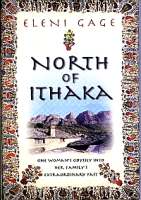Books and Good Reading.
Title:
North of Ithaka. Author:
Eleni Gage. To
get the most out of this book, you really need to read Eleni
and A Place for Us by Nicholas Gage, Eleni Gage’s
father. These two books chart the history of the Gage family from
tragedy and an execution in a tiny village in So,
the question I asked myself is “Why would a young female
American-Greek journalist return to the village where her grandmother
was executed, and re-build the family home – the very place were her
grandmother had been imprisoned and tortured?” I have to admit that I
originally suspected it was done solely for its ‘story value’, but
became increasingly charmed as I read the book. The
old family home in Lia was ‘no more than a shell, grim piles of grey
stones swallowed by moss’, but Eleni II – despite a certain amount
of family disapproval, mainly from her father’s sisters who were
brought up in Lia – goes ahead with her plan. It seems that Eleni, despite her American trappings, is still tied to a past haunted by ghosts, and she believes that her plan may help turn those ghosts into ‘protective spirits’ for her future. Just
before she leaves for One
of the first things that young Eleni feels she has to do is to read for
the first time the story of her grandmother’s death and her father’s
childhood. She finds it strangely helpful, filling in the blanks in her
imagination, and feels it will help her reclaim the family house.
Various elderly villagers also provide small historical details.
Eleni sets about appointing a contractor to do the building work, and a
father-and-son team of Albanians, who are living with the next door
neighbours, are drafted in to do the heavy work. Slowly, Eleni is
absorbed into the village and the Greek way of life. She takes on Greek
Lent, with its lambades (no, not the dance – candles), and palm
crosses then Easter with its cookies, flower-decorated epitaphion,
interminable church services, and lambs entrails, and slowly the plans
for the house begin to take shape. Contracts were signed, permissions
were granted and things could finally start to happen. Eleni
is keen to keep all mementoes of her family found in the ruins of the
house, so is presented with a miscellaneous collections of items which
might – or might not – be part of her family history. From time to
time she becomes depressed with what she is doing and wonders if what
she is doing is a waste of money and energy, and worries whether it will
alienate the villagers. But out of the blue her eccentric architect
arrives and – after a blessing by the priest – the work finally
starts. Following local tradition, rooster is sacrificed on site, but a
smart remark about ‘enough blood being shed in the house already’
sets Eleni’s nerves on edge again. Eleni’s
parents make a visit to the village to participate in the three-day
festival around her father’s name-day. Her father manages to wreck her
hired car, but luckily escapes unhurt. Eleni’s aunts in Eleni
throws herself into Greek life, attending all the local events and
participating in traditional feasts and religious occasions, absorbing
her Greek heritage like a thirsty sponge. When
Kanta, one of Eleni’s aunts, comes to visit, she initially takes a
very depressing view of the work being carried out on family house, and
sharp words are exchanged between Kanta and Eleni. Eleni is forced to
accept that, for Kanta, the memories invoked by the house are too strong
for change. But then Kanta
has a dream about her mother, in which the earlier Eleni tells her to
look after her grand-daughter, and this brings about a complete change
in Kanta’s attitude to the house and what young Eleni is trying to do.
When
friends visit from Eleni
and Kanta celebrate a memorial service on the anniversary of the
original Eleni’s execution, and many of the villagers turn out to
support them and their words – ‘May you live many years to remember
her’ are very meaningful to both of them. Eleni
attends a ceremony commemorating all the dead of the Civil War and finds
her grandmother’s name on the memorial. She appreciates the fact that
it is there, but feels that the re-built family home will be a better
memorial to Eleni – the place where she had raised her children. Eleni’s
life in Lia is almost as different from her life in Lia as it is
possible to be. She learns about the ‘evil-eye’, has her future
predicted in coffee-grounds, and is given tips on how to dream the name
of her future husband. But despite all this, she manages to concentrate
on the building work and harmony seems to break out on the site as the
work progresses. The time
comes for her medical tests and her calm is ruffled a little to find her
cysts are still there and further tests are recommended. She visits a
monastery and prays in the church there for her health. When she returns
to the hospital for the result of her tests, she finds they are
‘within normal range’. Eleni feels she has had a reprieve, that she
still has work to do and has been given time and permission to do it. By
the beginning of December, the house still has no bathroom, electricity,
floors, doors or windows, and Eleni’s parents arrive for a
Thanksgiving visit. Soon the bathroom is installed, the front door and
shutters are in place and the electrician promises to visit. And Eleni
prepares to return to Although
she leaves Lia to return to
Reviewer.
|
